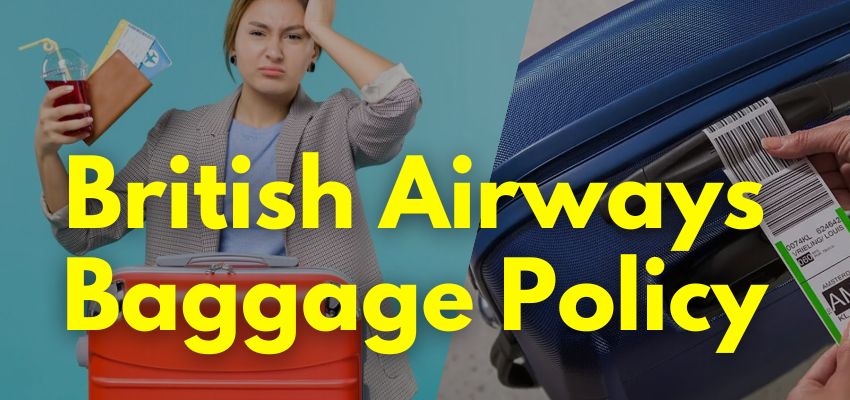When it comes to planning your next trip with British Airways, one of the essential aspects to consider is the baggage allowance. Understanding the rules and regulations surrounding your luggage can save you time, money, and potential headaches at the airport. In this comprehensive guide, we’ll break down the British Airways baggage allowance in simple terms, helping you pack smarter and travel stress-free.
What is British Airways Baggage Policy?
British Airways baggage allowance policy can vary depending on several factors, including your class of travel, ticket type, frequent flier status, and the specific route you are traveling. As airline policies can change over time, it’s important to check the most up-to-date information on the British Airways website or with the airline when booking your flight. However, as of my last knowledge update in January 2022, here is a general overview of British Airways baggage policy:
Carry-On Baggage
- Economy Class: Passengers are generally allowed one piece of carry-on baggage and one personal item (e.g., a laptop bag or handbag).
- Premium Economy, Business Class, and First Class: Passengers typically have an allowance of two pieces of carry-on baggage.
The maximum dimensions for each piece are usually around 56cm x 45cm x 25cm (22in x 18in x 10in). The maximum weight for each piece is typically around 23 kg (51 lbs), depending on the class of travel.
Checked Baggage
- Economy Class (except for Basic fares): Passengers typically receive one piece of checked baggage with a maximum weight of around 23 kg (51 lbs).
- Premium Economy: Passengers generally receive two pieces of checked baggage, each with a maximum weight of around 23 kg (51 lbs).
- Business Class: Passengers typically have an allowance of two pieces of checked baggage, each with a maximum weight of around 32 kg (71 lbs).
- First Class: Passengers usually have an allowance of three pieces of checked baggage, each with a maximum weight of around 32 kg (71 lbs).
The exact British Airways baggage allowance may vary depending on the route, ticket type, and other factors, so it’s important to check your specific allowance when booking your flight.
Infants
- Infants traveling on a parent’s lap usually receive a baggage allowance for a reasonable amount of checked baggage.
Sports Equipment
- Special items such as sports equipment (e.g., skis, golf clubs) may be subject to specific policies and fees.
It’s essential to check British Airways Baggage Allowance policy or contact the airline directly to get the most current and detailed information about baggage allowances, fees, and policies for your specific journey, as these policies can change and may vary based on your travel details.
What are the types of British Airways Baggage Fees?
British Airways baggage allowance fees can vary depending on your class of travel, ticket type, destination, and frequent flyer status. Fees and policies may also change over time, so it’s essential to check the most up-to-date information on the British Airways website or with the airline when booking your flight. As of my last knowledge update in January 2022, here is a general overview of British Airways baggage fees:
Excess Baggage Fees
If your checked baggage exceeds the weight or piece limits specified in your ticket’s British Airways baggage allowance, you’ll typically be charged an excess baggage fee. These fees can vary depending on the route and the excess weight or number of bags.
Oversized Baggage Fees
Oversized or irregularly shaped baggage that exceeds the airline’s size restrictions may incur additional fees.
Additional Baggage Fees
Passengers traveling in the lowest fare classes may not have any checked baggage included in their ticket. They can purchase baggage allowances as needed, but fees will apply.
Sports Equipment Fees
Special items such as sports equipment (e.g., skis, golf clubs, surfboards) may have additional fees, and the charges can vary.
Excess Baggage Charges at the Airport
If you haven’t pre-paid for your extra baggage online and you bring more baggage than your allowance to the airport, you may face higher fees than if you had arranged it in advance.
It’s important to note that British Airways may have specific policies and fees for different routes and ticket types, so it’s recommended to check the most up-to-date information on the British Airways website or directly with the airline when booking your flight. This will ensure that you have the latest details on British Airways baggage allowance fees and policies that apply to your specific journey.
Conclusion
Navigating British Airways baggage allowance doesn’t have to be a daunting task. By understanding your ticket type, travel class, weight limits, and dimensions, you can ensure a smoother travel experience. Packing efficiently and adhering to the airline’s guidelines will help you avoid excess baggage fees and make your journey more enjoyable. Remember, when in doubt, check the official British Airways website or contact their customer service for the most up-to-date information on baggage policies, as these rules can change over time.

